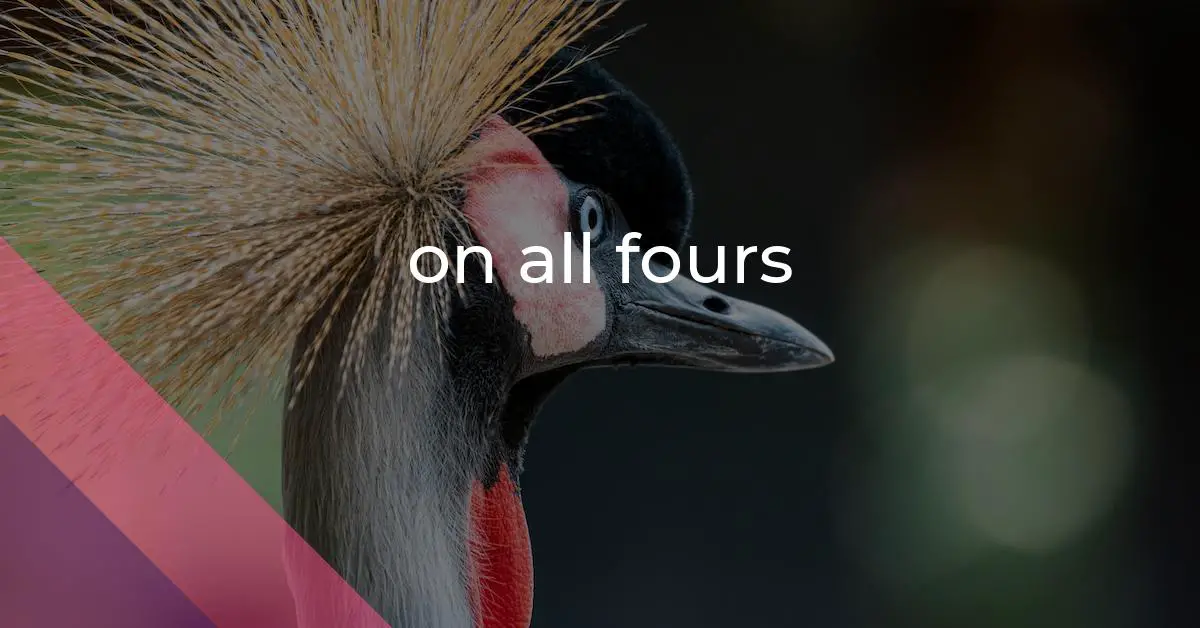on all fours: Idiom Meaning and Origin
What does ‘on all fours’ mean?
The idiom "on all fours" typically means being in a position where all four limbs are touching the ground, resembling an animal on hands and knees. However, in a figurative sense, it can also refer to being in a vulnerable or submissive position.

Idiom Explorer
The idiom "wait upon hand and foot" means to serve someone in an extremely attentive and subservient manner, fulfilling their every need and desire.
An idiom meaning to be in a difficult or challenging situation that needs to be resolved or fixed. It implies being in a state of trouble or inconvenience.
The idiom "open one's legs" is a vulgar phrase that refers to a person, typically a woman, willingly spreading their legs, often implying a sexual connotation. It is important to note that this phrase is highly inappropriate and offensive.
The idiom "on the whole" means considering all aspects or generally speaking.
The idiom "on-the-spot" means to be in a situation where decisions or actions must be made immediately, without any time to prepare or think about it.
The idiom "on the spot" means to do something immediately or to be put in a situation where one is required to perform or make a decision without any preparation or advance notice.
The idiom "on the skids" refers to a situation or person that is in decline or deteriorating. It can describe something or someone facing a loss of reputation, success, or stability.
The idiom "on the ropes" means being in a difficult or vulnerable position, usually in a competition or struggle.
Idiom: *on the point of*
Meaning: About to do something or reach a particular state or condition.
The idiom "on the loose" means to be free or not captured, often used to describe a person, animal, or thing that is roaming or causing trouble.
Idiom's Literal Interpretation
The idiom "on all fours" is a phrase that has been in use for centuries. It can be interpreted literally or figuratively. Literally, it refers to the position of a person or animal being down on hands and knees, with all four limbs touching the ground. Figuratively, it is often used to describe a situation where someone or something is in a vulnerable or submissive position.
The origin of this idiom can be traced to the behavior and anatomy of quadruped animals, who commonly move by walking on all four limbs. However, the exact origin of the phrase is unclear. It has been used in English literature dating back to the 16th century, indicating that it has been a part of the language for several centuries. The figurative use of "on all fours" emerged in the 18th century and has since become a common expression in everyday language.
The figurative meaning of "on all fours" can be interpreted in various contexts. One interpretation is that it is used to describe a situation where someone is physically or emotionally vulnerable, in a position of weakness or subordination. For example, a person who is crawling on all fours may be seen as submitting to another's authority or being in a position of disadvantage. Similarly, a person who is on all fours emotionally may be seen as feeling helpless or desperately seeking support.
Another interpretation of this idiom is that it is used to convey the idea of thoroughness, completeness, or being closely aligned with something. When someone says that they have examined a situation "on all fours," they imply that they have thoroughly investigated and considered all aspects of the matter. In this context, "on all fours" denotes a sense of meticulousness or attention to detail.
It is worth noting that the idiom "on all fours" may also have different interpretations in different cultural contexts. While it generally carries the same underlying meaning, the specific connotations and associations attached to this idiom can vary across cultures and languages. Therefore, the cultural context in which this idiom is used should be considered to fully understand its intended meaning.
Related idioms to "on all fours" include "on one's knees," "on one's feet," "flat on one's back," "on the ropes," and "at one's feet."
"On one's knees" is an idiom that refers to being in a position of submission or supplication. This phrase can be used to describe a person who is pleading or begging for mercy, forgiveness, or assistance. It implies a state of vulnerability and dependence on someone else's mercy or power.
"On one's feet" is an idiom that refers to being in a standing or upright position. It can be used to describe someone who has recovered from a difficult situation or has regained their strength after a setback or illness. This phrase conveys a sense of resilience, determination, and independence.
"Flat on one's back" is an idiom that describes someone lying down on their back, usually as a result of exhaustion, illness, or defeat. It can be used to convey a state of physical weakness or helplessness, as well as a metaphorical sense of being overwhelmed or defeated.
"On the ropes" is an idiom that originates from boxing, where it refers to a boxer who is in a vulnerable or weakened state, often near defeat. In a broader sense, it can be used to describe someone who is in a difficult or precarious situation, struggling to cope or survive. This idiom conveys a sense of imminent failure or defeat.
"At one's feet" is an idiom that describes someone in a position of subordination or devotion to another person. It can be used to depict someone who is completely under another's influence or control. This phrase conveys a sense of adoration, admiration, or servitude.
The idiom "on all fours" has both a literal and a figurative meaning. Its origin dates back several centuries, and it has become a common phrase in everyday language. This idiom is often used to describe a state of vulnerability or submission, as well as thoroughness or completeness. While its exact origin remains uncertain, its usage and significance have evolved over time. The idiom "on all fours" continues to be widely used, carrying a sense of both vulnerability and thoroughness, leaving us with an enduring fascination for its true origins and potential future interpretations.
Example usage
Examples of how the idiom "on all fours" can be used in a sentence:
- 1. The child was crawling on all fours, pretending to be a puppy.
- 2. After slipping on the wet floor, he ended up on all fours trying to regain his balance.
- 3. The hiker was exhausted and had to crawl on all fours to navigate through the narrow cave.
More "Position" idioms



